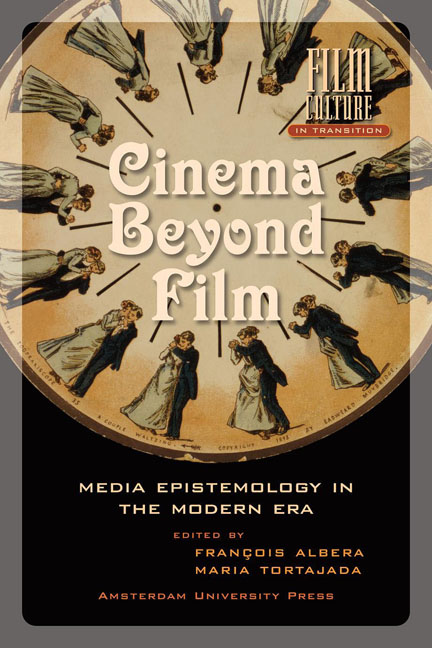Projected Cinema (A Hypothesis on the Cinema’s Imagination)
Published online by Cambridge University Press: 22 January 2021
Summary
When one examines very different kinds of statements (énoncés) (scientific and technical documents, works of popularisation, legal, moral or political texts) written during the 19th and 20th centuries and not belonging to mainstream institutions or practices dealing with the technology involved in recording, reproducing and transmitting sounds and images, one finds a considerable literature devoted to the field – whether novels, tales, amusing or illustrated stories, sketches, and so on. They are peripheral in relation to the institutional field (covering invention, exploitation and spectacle) but ‘exploit’ the technical objects of communication within their own space – and their stories – and imagine new objects to suit their anticipatory nature and purpose.
Despite their apparently secondary or even futile place – one might think that they are reduced simply to quoting or using what science and technology have implemented – they nonetheless have their own worth, which, in the perspective I shall develop here, is comparable to that of the others.
In both newspaper articles and academic papers on the cinema and later on television, reference was quickly, and increasingly often, made to the most famous of them – Villiers de L’Isle Adam’s Tomorrow’s Eve – joined more recently by Jules Verne’s Carpathian Castle and Adolfo Bioy Casares’s The Invention of Morel – for their presentiment about ‘the’ or ‘a’ cinema to come.
But there are other works that have been catalogued within the genres of science fiction, or futuristic (anticipatory) and utopian works.
When one looks anew at this sundry and multifarious set of works, one finds – when taking the widest possible perspective – at least two grounds for pursuing research: a) the texts do build up a diegetic universe – there is thus verisimilitude, capable of making the reader believe in the world put forward – which they fill with technological objects that are seen as everyday and ordinary, to be used by one and all and thus even commonplace; b) the anticipatory gap – sometimes of only a few years, sometimes a century – or the geographical distance (a mysterious island, another planet) underline certain characteristics of these objects whose functions and properties are ‘prolonged’ as they are developed and perfected in relation to the present moment (of the writing).
- Type
- Chapter
- Information
- Cinema Beyond FilmMedia Epistemology in the Modern Era, pp. 45 - 58Publisher: Amsterdam University PressPrint publication year: 2012



